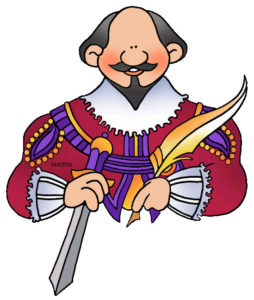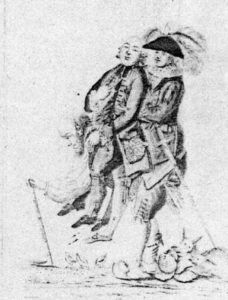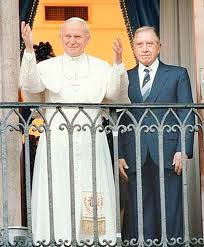 “… that is the question,
“… that is the question,
Whether ‘tis nobler in the mind to suffer
The slings and arrows of outrageous fortune,
Or to take arms against a sea of troubles,
And by opposing end them? …”
(Hamlet, act 3, sc. 1)
Comment. Yes, indeed, is it nobler in the mind to be deaf and blind towards criminals in power, or to take arms against unspeakable crimes against humanity and by opposing (at least try to) end them? The answer would seem obvious, especially if he or they who must decide are the appointed or self-appointed prime minister and ministers of God, respectively.
Instead the answer is anything but obvious – or rather, if becomes more clear to him who takes the trouble to familiarize himself with the essentials of Church history, setting aside easy-on-the-tongue formulas (e.g. the will of God) or convenient stereotypes (e.g. all men have faults, etc.).
Before attempting what must be by necessity a very concise and superficial summary, we should first describe what some readers may already know.
In a book by Horacio Verbitsky titled “El Silencio” it is alleged that the newly elected Pope did not save or delivered to their persecutors two priests whose fault it was to have continued with their mission in the slums of Buenos Ayres, notwithstanding receiving an injunction to stop.
The Vatican has rejected the accusations. Verbitsky has objected to the rejection and said as follows,
*** The two Jesuits lived in a religious community and evangelized the inhabitants of the slums as part of the (at the time) “third world” commitment of the Company of Jesus.
*** As Bergoglio got wind of the impending coup (by the Junta), he told them to leave their job. According to him, to protect them – according to them, to remove and terminate a social commitment of which he disapproved. In general, it is said that Bergoglio favored a form of abstract spiritualism to which his subordinates had to adhere.
*** In an extant document in the Archbishopry of Buenos Ayres it is written, “Notwithstanding the good will of Father Bergoglio, the Company (of Jesus) has not being cleansed. The left-leaning Jesuits, after a short period, and with much support from abroad and from certain third-worldist (sic) bishops, have begun a new phase. “Third-worldist” is a qualifying adjective for priests who embraced the so-called Liberation Theology, liberation from oppressive social conditions, that is.
*** So far the data speaks by itself. From now on the issue is in dispute. One of the two priests was detained (and apparently tortured) in the infamous Buenos Ayres torture hall of the Argentine Navy. In another extant government document a functionary writes that the said detained priest had conflicts with the hierarchy and refused to obey orders. This information, the functionary adds, was provided by Father Bergoglio.
*** In the year 2000, the Church officially expressed her excuses for the years of the “dirty war” by the Argentine Junta. The wording was such as to mean that it was not the Church but some of her sons who had sinned and she was asking forgiveness on their behalf (whatever that means).
*** When “El Silencio” came out, Bergoglio, after stating that the Verbitsky’s book was an infamy, sent a subordinate to him asking why he had published the book. Verbitsky says now that, at the time, he answered with a counter-question, “What should I have done with the documents? Burn them? Pretend that I did not see them? That would have been an infamy.”
So much for the specific case. To understand the more general (and I think crucial) issue, we must revert to that critical period around the 1100 – 1200 AD where the position of the Church in the world became more clearly defined. Until then there had been a bitter (and bloody) feud between the (Western Roman Empire) Emperors and the Popes. The issue was about who should have the right to appoint the Bishops. Not a trifling business, because a Pope-appointed Bishop could easily become a thorn in the politics and day-to-day business of the empire administration. The Pope won and the structure of society – as established by the Church – is well described by a cartoon that was circulating at the time of the French Revolution, 500 years later.
 The nether world is structured as follows, first comes the Church that rules on all the matters of the spirit and the soul. Second comes the nobility who rules on the civil world and has the task of defending it from the attack of enemies and heretics. In exchange for these services, peasants and other members of the third and lower class must maintain, feed and clothe the members of Church and Nobility.
The nether world is structured as follows, first comes the Church that rules on all the matters of the spirit and the soul. Second comes the nobility who rules on the civil world and has the task of defending it from the attack of enemies and heretics. In exchange for these services, peasants and other members of the third and lower class must maintain, feed and clothe the members of Church and Nobility.
Call it philosophy, policy or mind-set it has not changed even after the French Revolution. Through the XIXth and XX century the history of the Church is a record of continual bitter opposition to any social reform (of which, in the instance, the two “third-worldists” priests in question were representative).
Some may ask, how about all the work of the Church to alleviate the suffering of the poor? The Church does wonders in helping the poor, as long as the help is (to be concise) in the style of Mother Theresa. But whenever the help drifts towards social reform the opposition is as bitter and strenuous as it was in the Middle Ages.
For example, among the voluminous history of “heresies”, one of the better known is that of the Cathars – a sect that lived in the South of France. “Cathars” means “the pure”. They were not hurting anyone and advocated a very simple style of life. They had no internal kings or rulers, just what today we would call “spokesmen”. Roughly speaking they were “Manicheans”, that is, for them this world is the work of the devil. The best one can do is go through it as best as he can in the least conspicuous and obnoxious life-style.
Though there are no records of evangelization campaigns by the Cathars, the philosophy (or religion) spread and the Church took very defensive action. They were literally destroyed to the point that even their language was extinguished (the disappeared French of the “langue d’oc”).
In the massacre at Beziers (1209 AD), where the last Cathars made their last defense, every one was killed. One of the commanders of the crusade was the Papal Legate Arnaud-Amaury, Abbot of Citeaux. When asked by a Crusader how to tell Catholics from Cathars once they had taken the city, the abbot allegedly replied, “Kill them all, God will know His own” – “Neca eos omnes. Deus suos agnoscet”.
 To return to our times, Pope Bergoglio is no different from John Paul II (already beatified !), great friend of Pinochet, (see picture) – though Woytila concentrated his efforts more towards helping to dismantle the Soviet Union and the other popular East European republics (where, in truth, the ‘popular’ connotation had lost its meaning).
To return to our times, Pope Bergoglio is no different from John Paul II (already beatified !), great friend of Pinochet, (see picture) – though Woytila concentrated his efforts more towards helping to dismantle the Soviet Union and the other popular East European republics (where, in truth, the ‘popular’ connotation had lost its meaning).
There are those who say that Pope Francis I is the right-wing populist response of the Church to Hugo Chavez and his legacy. The response includes the telling name of Francis and the already broadly reported gestures of humility.
Back to history again. The Franciscan order was the (successful) attempt of the Church to bring under control a Europe-wide movement of revolt against what was perceived as the betrayal (by the Church hierarchy) of the Christian principles. By what we call today the “sponsoring” of St. Francis the Church blocked a revolt that would have hit Rome at the core.
To conclude, the number of victims of the Junta is assumed to range between 30,000 and 40,000 from 1976 to 1983 – among them 130 Liberation Theology priests.
It is interesting and meaningful to observe that, during the same period, Liberation Theology priests were defrocked and unprotected while pedophile priests remained frocked and shielded. But, I assume, for those who have the faith, all this information is irrelevant. It was Mark Twain who said, “Faith is believing what you know ain’t so.”
Tips for Use. The first line is known by just about everyone, therefore you can customize it at will – yet everyone will recall or perhaps feel the impact of the original – e.g. “To buy or not to buy”, “To sell or not to sell” etc. Use sections of the monolog as a biographical statement, e.g. “(I have suffered) the slings and arrows of outrageous fortune and the thousand natural shocks that flesh is heir to.” Also a good answer during a job interview.
In the play. Hamlet does what he is famous for doing, meditate and be in doubt. First he is in doubt but then he is not sure.
Original Image, http://literature.mrdonn.org/britain_william_shakespeare.gif

Jimmie, what a coincidence: just now I’m reading “Crusade Against the Grail” by Otto Rahn, a book about the “Struggle between the Cathars, the Templars, and the Church of Rome.” It confirms in more detail what you have said above. I grew up in a Catholic home, Catholic town, Catholic – for all I knew – country, and although I no longer belong I still have sentimental feelings for Catholicism. However, reading about the horrors of the extermination of the “heretics” with the concomitant appeal to God and Jesus for aid and glorious victory is so utterly disgusting that I lost all sentiment for what I knew as child.
It was eye-opening to realize that what happened then, ca. 800 years ago, was the result of the same ignorance and zealousness that the radical Muuslims of today display.
Well, don’t stop talking the truth just because some people resent it.
Rita